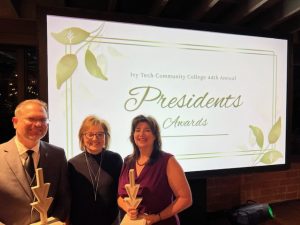
Ivy Tech Community College recently recognized two Evansville faculty members for their exemplary teaching.
Donna Zimmerman, professor and Department Chair of Advanced Automation and Technology and Industrial Technology; and Adam Meredith, associate adjunct faculty for the School of Arts, Sciences, and Education, have been honored with the President’s Award for Excellence in Instruction at Ivy Tech Community College. The two were honored by President Sue Ellspermann at a statewide event in Indianapolis in November.
Donna Zimmerman
Zimmerman, of Evansville, IN, has been employed as an Ivy Tech faculty member at a variety of levels since 2005 and began serving as program chair or department chair beginning in 2015. She has been involved in getting students interested in service learning and founded the Robotics Club, hosting at least one competition for area youth annually.
Zimmerman says she believes the ability to increase the number of diverse students in her fields is to reach them where they are and help them grow to their fullest potential. She said she looks at Maslow’s Hierarchy when doing that. “Students need to feel safe and secure before they can free their mind to study. We may have to provide food, come to their neighborhoods, become trusted by their families to be respected enough to earn their focus and attention. I try to show them their potential.”
When students have challenges, Zimmerman says, despite the type of challenge, it is important to keep them engaged in the college work. “I need to keep them engaged, work around jobs, catch them up on basic skills, and encourage them to become life-long learners. I want to challenge each to their fullest potential.” At the core, she says, she treats each person as an individual. She said that she believes in being a “partner” in their learning. “Students bring in their work experiences and I integrate that into their lessons and projects. They can explore projects of their choosing. It is my responsibility to ensure they are exploring quality projects and that they will gain from these experiences.”
Her innovation in the classroom was most evident in the projects around service learning and adaptive technologies. Beginning in 2015, she and students began making adaptive technology devices to donate to local school systems –keyboard covers, and adaptive toys. 3D Printed prosthetics was also a large project, and during the Covid 19 shutdown, 3D printed masks and visors were made and donated. A large joint project with the Welding Program allowed for a student who was wheelchair bound to stand up for his job opportunities and at commencement.
Adam Meredith
Meredith, of Henderson, KY, has taught history and political science courses in the School of Arts, Sciences and Education since 2014. He says his teaching philosophy centers on providing students with a knowledge of history coupled with the ability to analyze and interpret historical events, persons, places and things in a way that allows them to better understand their own lives and their future. “I strongly believe the best way to teach is to make it feel “relevant.” History as a discipline all too often is overlooked as unimportant compared to economics, the medical field, or the sciences, where their study has a more recognizable, practical application,” Meredith said. “I cannot count the number of students who come into my class believing they hate history, or worse, that it is “boring.” My purpose as an instructor is to connect them to the past in a way that makes history enjoyable and inspires them to learn more about it. Hands-on items combine with visual storytelling to make the past “jump out” at them.”
Meredith is known to come to class dressed in period attire. He said images, videos, sound recordings, as well as historical items from his collection all bring the story to life in a way most students have not experienced. “When students can see how people dressed and hold objects from the past, it makes a stale subject on a page reality,” Meredith said.
Meredith said he models his teaching on a history instructor he had in college, who routinely brought in objects like a full buffalo robe, beadwork, and “in one memorable case – a barbequed buffalo tongue the he allowed us to eat.” He said all of his 20th century pieces are original, and when needed he sews his own outfits.
He has spoken as a part of numerous historical conferences, as well as guest lectures and presentations.




